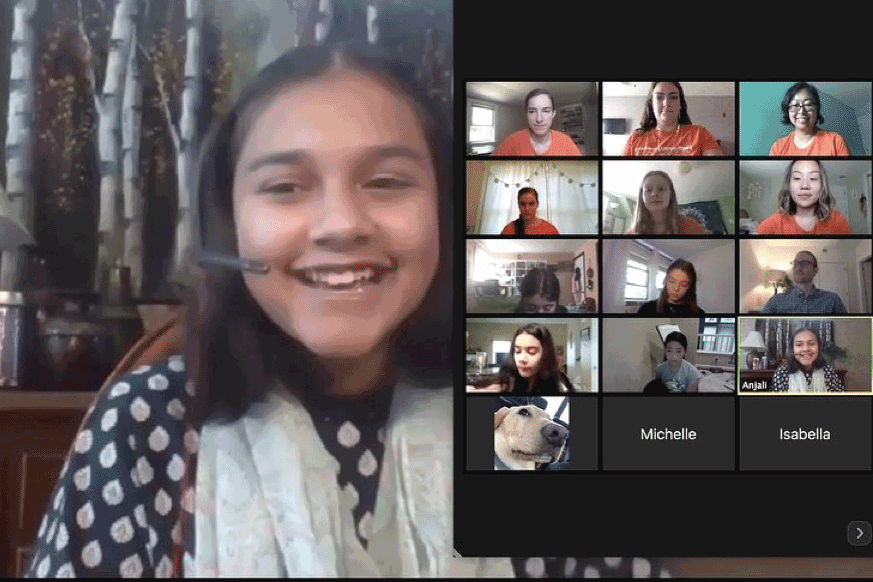
Many adolescents have been stuck at home this summer, and as a result have spent significant time on social media or gaming. That makes this a particularly critical moment for them to examine their relationship to technology, and a group of middle schoolers from across the country recently did just that. During the week of July 27, the Wellesley Centers for Women teamed up with the Wellesley College Computer Science Department to host a virtual workshop that helped adolescents explore their identities, introduced them to STEM (science, technology, engineering, and math) concepts, and taught them about healthy social media use.
“Technology can play either a negative or a positive role in these students’ lives, depending on how they use it,” said Dr. Linda Charmaraman, a co-leader of the workshop, senior research scientist at WCW, and director of the Youth, Media & Wellbeing Research Lab. “Especially during this time when they may be on their phones and computers more than before, our aim is to teach them to use technology intentionally and in healthy ways. If they learn to do that, it can be a powerful force in helping them form their identities and supporting their overall wellbeing.”
Twenty-three 11-14-year-olds, who hailed from Massachusetts, Washington DC, and California, attended the online workshop co-led by Dr. Charmaraman and Dr. Catherine Delcourt, assistant professor of Computer Science at Wellesley College. It was funded by the I Am Strong Foundation of Westwood, MA, which is dedicated to shattering the stigma of teen mental health struggles.
Guest speakers included Budnampet Ramanudom ’18, a Wellesley College graduate who now works as a software engineer at Google; Kai Lukoff, a doctoral student from the University of Washington who developed an app promoting safe YouTube use; and Gitanjali Rao, the 14-year-old developer of anti-cyberbullying app Kindly, who has teamed up with Microsoft, done TED talks, and is one of Forbes’ “30 Under 30.”
Current and former Wellesley College students Julia Cromwell ’20, Tulani Reeves-miller ’21, and Sarah Wong ’19 spoke about how they decided to major in STEM, how they integrate their creative pursuits with a science/technology identity, and what mentors and role models they had growing up. And Kamilah Drummond-Forrester, director of the social and emotional learning program Open Circle, spoke to the students about the Four Critical Cs (Connect, Capable, Count, Courage) and how they can be used as guides to promote positive social media use.
Throughout the program, the students participated in digital storytelling activities using the Seesaw app, creating selfies, online personas, identity charts, and self-reflection essays about how the guest speakers helped them imagine possible futures. To cap off the four-day workshop, participants collaboratively designed and test-drove a social media site and presented a talent show to express their individuality.
Tamatha Bibbo, the principal of Pollard Middle School in Needham, which sent 10 students to the workshop, was glad to partner with WCW. “Middle school students are at a point in their lives where they’re developing their identities, and technology plays a big role,” she said. “This was a wonderful opportunity for them to examine that process a little more closely, and get exposure to the possibilities of careers in STEM as well.” Two high school students from Needham, Mercedes Noelia Hainzl Fernández and Jessica Hung, also served as workshop interns.
The idea for the workshop grew out of an ongoing research study about middle school students’ social media use, health implications, and parental monitoring led by Dr. Charmaraman and funded by the Eunice Kennedy Shriver National Institute of Child Health & Human Development of the National Institutes of Health. The study’s school partners were strongly interested in how the Youth, Media & Wellbeing Research Lab could help promote healthy social media use in their students immediately, rather than wait for the results of the longitudinal study. This is the second year the workshop has been held, though the first time it was entirely online.
“We were excited to be able to put our research into action by holding this workshop again this year,” said Dr. Delcourt. “The online format allowed us to open it up to students across the country, and it was great to have such a positive response. We hope that by discussing complex social issues alongside technical concepts, we can co-develop solutions that promote more positive social media behaviors.”
August 20, 2020

